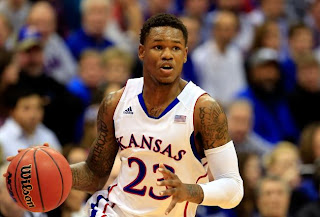Lyric from: The Great
Pretender from the album The Great Pretender
Written By: Buck Ram
Performed by: The
Platters
 | ||
| Courtesy of Sports Illustrated |
We should really be ashamed of ourselves.
A couple of months ago, we squandered away a perfect
opportunity to have a meaningful conversation about one of the uglier side
effects of homophobia.
And no, I’m not talking about the gay slurs, the judgmental
ignorance or religious superiority born of the confusion that people assume while
trying to fathom the idea that some men and women would prefer to experience
love and sex with a person of the same gender.
In this story that appeared in the May 6, 2013 issue of Sports Illustrated, 12-year NBA veteran
Jason Collins came out of the closet in grand fashion. It is a beautifully
constructed piece written by Collins himself that literally and figuratively opens
the door on his journey to self awareness and on his decision to live a more
authentic life.
In the article, Collins talks about the effort that he put
into deceiving himself having realized at age 12 that he did not identify with his twin
brother Jarron's attraction to girls and how he suppressed his impulses through
his high school years.
He goes on to say he felt pressure “to live a certain way,
to marry a woman and raise kids with her”. He writes that he dated women when
he was younger and that he “even got engaged” as part of that deception.
In the time since he went public, Collins has been
celebrated as a hero and, we have learned that Carolyn Moos was the woman to
which he had been previously engaged.
Moos shares her side of the story in the latest issue of Cosmopolitan. You can read the article
here.
In it she talks about the pain of finding out that Collins
was gay at the same time as the rest of us-when the SI article came out. She had been clueless about his homosexuality,
only then piecing together that it must have been the reason why he called off
their wedding in 2009 after eight years together.
Moos wants to tell her story now to help other women.
“My inbox exploded with emails from women saying the same
thing happened to them,” she told the magazine. “I’m sharing what I’ve learned
from my experience in hopes that it might help others.”
Thank goodness she’s getting the discussion started since
no one else has been willing to.
Or maybe it’s just that no one else remembered to.
We were so busy trying to prove that we were okay with Jason
Collins being a gay player in the NBA (which we all are, right?) and
commemorating his courage that we forgot to consider how much pain his previous
cowardice and deceit might have caused his loved ones.
In his big announcement, Collins glosses over his eight-year
engagement and references how miserable it was for him to live a lie. He doesn’t say much, however, in the way of acknowledging
how much his lies may have hurt other people.
I do not pretend to know how difficult it was for Collins-or
any other gay man for that matter-to come out of the closet. Nor am I in a
position to make any judgments about the timeframe in which they choose do so.
But I can’t imagine the devastation of learning that the man you’ve loved and shared a life with for eight years was nothing more than a compliant poser, using the relationship as a disguise until he built up the nerve to reveal his true identity.
We’ve all heard the stories about how this type of covert
homosexuality temporarily destroys families and ruins marriages as loved ones
try to make sense of it all. And we don’t usually honor the newly un-closeted
gay person at the center of all that destruction for their bravery.
We gave Jason Collins a pass on that because we were ready to reach this milestone in a major sport, because he’s a “pro’s pro” and; because he seems like a genuinely good guy.
But with that pass, we threw away a chance to have a more complete dialogue-one in which we concede that the effects of homophobia are far reaching. Gays are backed into a corner by our bigotry and their loved ones become unavoidable casualties.
We should have asked that Collins paint the entire picture, talk more openly about the pain his pretenses have caused along the way and the remorse he must feel about that. He was the perfect guy to demand that our society move more quickly toward true acceptance of gays and lesbians not only for their sakes but for the sakes of the “other side of the story” victims who get trampled in the wreckage of intolerance.
As he took center stage to make his announcement, we should have seen fit to offer a compassionate nod to all those sacrificial lambs he encountered on his path to self discovery.
Instead, we only shouted Bravo!


